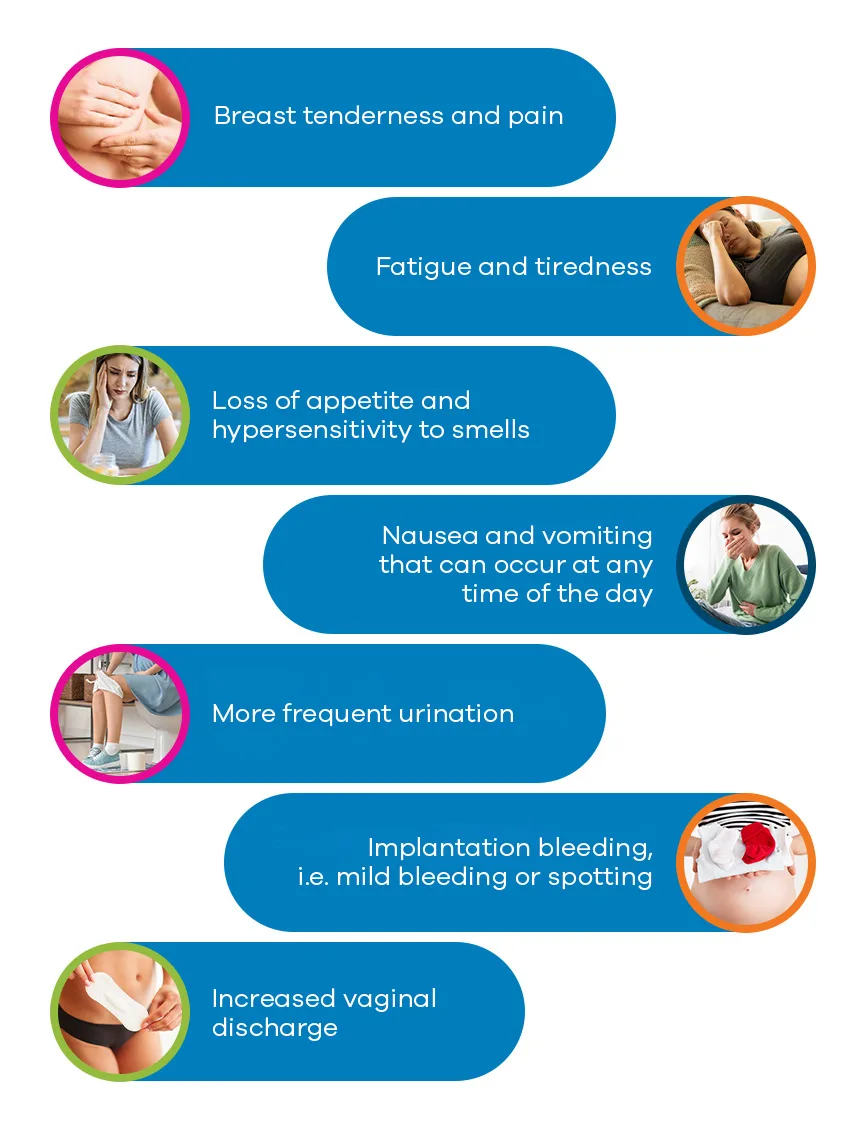
Pregnancy symptoms – how to know if I'm pregnant?


All content within this page has been reviewed by
Dr Tariq Miskry, Consultant Gynaecologist & Obstetrician


Many women cannot wait for the first signs of pregnancy to appear. Although vomiting, fatigue and implantation bleeding are not pleasant, these can mean that you are expecting your long-awaited baby! Sometimes, the only pregnancy symptom is not having your period on the expected date – this is perfectly normal! Learn about the symptoms of pregnancy in first month and see if pregnancy without symptoms is possible.
Table of content:
First signs of pregnancy
Every woman may experience the first days and weeks of pregnancy differently. The presence and severity of the first signs of pregnancy is an individual matter and depends on many factors. Some pregnant women can observe many different symptoms almost right from the start, while others do not experience the hardships of the onset of pregnancy at all. Furthermore, the symptoms occurring in the second and each subsequent pregnancy can vary significantly. In some cases, the first, subtle signs of pregnancy shortly after conception, while in others, it is only after a few weeks that the woman begins to feel the whole range of typical pregnancy discomforts. Sometimes, pregnancy without symptoms is also possible, with the mother-to-be only beginning to suspect that she is pregnant when her period does not occur on the expected date. However, before we proceed to list and describe typical pregnancy symptoms, let us consider – when does pregnancy actually begin?It is assumed that the first day of pregnancy is the first day of the last menstrual period. This is a very important date for every mother-to-be – it is based on this date that the further weeks and months of pregnancy are counted, and the expected delivery date is estimated. In reality pregnancy does not start until conception which is day 14 of the cycle (in a 28 day cycle).
This is because, historically, the last period was the only information available to date a pregnancy. As a result, we talk about weeks of ‘pregnancy’ rather than weeks from conception. This is why there are no pregnancy symptoms until after conception. These only appear after some time, when the baby starts to develop in the uterus. The most common early pregnancy symptoms include:
- implantation bleeding, also known as implantation spotting, is mild bleeding or spotting that is caused by the embryo implanting in the uterus. It is completely normal and creates no risk to the baby. It is important to remember that not every woman experience implantation bleeding – pregnancy can develop normally even if spotting does not occur;
Find out what the pregnancy discharge colour means and when you should see a doctor about spotting. Sometimes implantation bleeding gets mistaken for a period so if you experience bleeding that is different to normal or comes at a different time than expected, you should consider doing a pregnancy test. - nausea and vomiting – although these symptoms are sometimes referred to as “morning sickness”, they can actually occur at different times of the day and, in some cases, even make it difficult for a woman to eat properly. One of the main causes of nausea and vomiting in pregnancy is considered to be the pregnancy hormone beta-HCG, the concentration of which increases rapidly during the first weeks of pregnancy;
- fatigue – tiredness in pregnancy often occurs already in the first weeks after conception and usually subsides by the end of the first trimester of pregnancy. During this time, you may feel sleepy or even exhausted and need much more rest and sleep than before. Fatigue is a sign that your body is working hard, adapting to the numerous pregnancy changes and preparing for the weeks and months ahead;
- headaches – these can be caused by hormonal changes occurring in the first weeks of pregnancy. Headaches can also be caused by stress – perhaps you are just pensively waiting for a positive pregnancy test result?
- diarrhoea in early pregnancy – is one of the rarer symptoms of pregnancy. It occurs mainly in women who are very sensitive to hormonal changes and react to them with intestinal problems;
- ovarian pain – mild pain, stinging and pulling in the ovarian area means that the uterus is expanding and gradually becoming bigger, with its ligaments starting to stretch. Such occasional pain symptoms are perfectly normal and poses no risk to the baby;
- increased discharge – white discharge is one of the normal early signs of pregnancy and affects some women in the first weeks. If its colour is different (yellow, greenish), this may indicate an infection.
Some pregnancy symptoms, especially diarrhoea, nausea and vomiting, can easily be mistaken for the symptoms of listeriosis. If, in addition to gastrointestinal problems, you develop fever, chills and muscle pain, you must talk to your doctor!

Pregnancy symptoms – first weeks
During the first weeks of pregnancy, your body prepares itself for fertilisation and, subsequently, for the safe implantation of the embryo in the uterus. Fertilisation usually occurs around day 14 of the cycle, right after ovulation. About a week after that, some women begin to observe the first subtle signs of pregnancy. As time goes on, the symptoms of pregnancy in first month become increasingly more evident, and you are starting to be sure that, in just 9 months, you will become a mother!2 weeks pregnant symptoms
The second week of pregnancy usually begins as soon as your menstrual bleeding and spotting have stopped. During this time, oestrogen levels in your body start to rise and the recently exfoliated endometrium thickens again. At the same time, several follicles begin to mature in one of your ovaries. The largest of these becomes the dominant follicle and is released from the ovary as an egg cell ready for fertilisation.
Learn about the menstrual cycle week by week.
As you can see, you are not pregnant yet in the second week. When calculating the duration of pregnancy, doctors use some kind of fiction – they assume that pregnancy begins on the first day of your last menstrual period, before the embryo is even fertilised and implanted. Nevertheless, you may experience some symptoms at this stage that we do not yet call pregnancy symptoms, but rather signs of ovulation. When the egg cell is released from the ovary, some women feel a slight prickling sensation and ovarian pain.
3 weeks pregnant symptoms
At the very beginning of the third week of pregnancy, right after the ovulation, a very important event usually takes place – fertilisation! It does not only mean that the egg cell and the sperm fuse together, but much more than that – in one short moment, a whole set of unique genes is created that determine almost every feature of your future baby. At this point, the mother-to-be does not yet know she is pregnant – the fertilisation symptoms are not noticeable at all.
Right after fertilisation, the combined cells, which we now call a zygote, begin to move through the fallopian tube towards the uterus. Its lining continues to thicken and prepares for embryo implantation, which usually takes place around eleven days after fertilisation. In women who have short menstrual cycles, implantation can occur as early as at the end of the third week of pregnancy. Sometimes this manifests itself as mild spotting, known as implantation bleeding. This is normal and harmless – it looks like pinkish or slightly blood-tinged mucus, which resolves spontaneously after a short time.
4 weeks pregnant symptoms
In the fourth week of pregnancy, the embryo implantation in the uterus would already occur in most women. This may be accompanied by implantation spotting, which is a typical symptom of the fourth week of pregnancy. If you notice mild spotting or bleeding, use pantyliners or Always Ultra Normal period pads, which will protect your underwear from stains. Always period pads are dermatologically tested so they will not irritate your skin, which can be particularly delicate and sensitive during pregnancy. In the fourth week of pregnancy, you can choose the smallest period pads – implantation spotting is not too heavy and resolves quickly. Since the egg has implanted itself in the soft, expanding mucous membrane, the embryo can more easily take up the nutrients it now needs for dynamic growth. It also begins to produce an important hormone necessary for the normal development of early pregnancy – human chorionic gonadotropin, or beta-HCG. At the same time, the production of another hormone – progesterone responsible for maintaining pregnancy – also increases. The higher levels of these hormones may lead to the first subtle signs of pregnancy before missed period, which include:
- breast tenderness and soreness,
- tiredness in pregnancy,
- mood swings,
- more frequent urination.
The first symptoms of pregnancy in the fourth week are similar to the symptoms of an upcoming menstruation. It is not yet possible to clearly confirm or exclude pregnancy based on those symptoms.
5 weeks pregnant symptoms
If you have not noticed any changes in your body so far, you should already start to feel the first symptoms of pregnancy in week 5. The most important of these is the absence of menstruation. When bleeding does not come at the expected time, you may start to suspect that you are expecting a baby. At this stage, some mothers-to-be are already experiencing a whole range of pregnancy symptoms, so they decide to do a pregnancy test.The most common symptoms at week 5 of pregnancy are:
- nausea and vomiting,
- increasing tiredness and drowsiness,
- mild, occasional pain and prickling in the ovary and groin area,
- hypersensitivity to smells,
- aversions to certain foods and drinks, even those you previously enjoyed,
- more frequent urination.
Some women may also experience mild spotting. If the amount of discharge is small, you should not be concerned. However, when you notice red blood spotting or even heavier bleeding and your pregnancy test is positive, you should talk to your doctor as soon as possible. You may need to slow down, spend more time resting or take prescription medication.
6 weeks pregnant symptoms
As week 6 arrives, the symptoms you experience that are typical of the first weeks of pregnancy may exacerbate. At this time, the concentration of pregnancy hormones increases very quickly, and these are mainly responsible for the onset of various symptoms.The most common symptom in the sixth week of pregnancy is the absence of menstruation, which should have already arrived several days ago. This is the signal for many women that they may be expecting a baby. Another important symptom is discomfort and pin in the lower abdominal area, which is caused by the stretching of the uterine ligaments. At this stage, the uterus itself is only slightly becoming enlarged, which means you will have to wait a little longer for your pregnancy belly to appear.
Other symptoms at week 6 of pregnancy include:
- sickness, nausea and vomiting,
- fatigue, lack of energy and increased need for sleep,
- mood swings,
- more frequent urination,
- further breast enlargement and tenderness,
- mild spotting (always consult your doctor!),
- increased discharge.
If you notice increased mucus and discharge, start using Always Dailies Fresh & Protect Normal Pantyliners. These will protect your underwear from staining and help you avoid discomfort.
Listeria and pregnancy symptoms
As you already know, some of the first signs of pregnancy can be deceptively similar to symptoms of the dangerous bacterial disease – listeriosis. In healthy people, it is usually asymptomatic or quite mild, so it can easily be mistaken for a common cold.Symptoms of listeriosis include:
- fever,
- muscle pain,
- chills,
- diarrhoea,
- vomiting.
Listeriosis is very dangerous for pregnant women – it often leads to miscarriage or is transmitted to the baby. If you experience listeria and pregnancy symptoms, consult your doctor as soon as possible!
Women who are pregnant or suspect they may be pregnant should protect themselves from listeria infection by avoiding eating certain foods (especially unpasteurised milk and milk products, raw meat and fish, and unwashed fruit and vegetables). If you notice the first symptoms of pregnancy, it is essential to exclude those foods from your diet.


